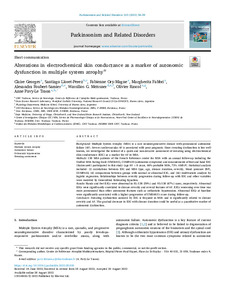Por favor, use este identificador para citar o enlazar este ítem:
https://repositorio.uca.edu.ar/handle/123456789/15470| Título: | Alterations in electrochemical skin conductance as a marker of autonomic dysfunction in multiple system atrophy | Autor: | Georges, Claire Pérez Lloret, Santiago Ory Magne, Fabienne Fabbri, Margherita Foubert Samier, Alexandra Meissner, Wassilios G. Rascol, Olivier Pavy-Le Traon, Anne |
Palabras clave: | ATROFIA MULTISISTÉMICA; ENFERMEDADES NEURODEGENERATIVAS; DISFUNCION VENTRICULAR; SISTEMA NERVIOSO AUTONOMO; SUDORACIÓN; HIPERTENSION ARTERIAL | Fecha de publicación: | 2022 | Editorial: | Elsevier | Cita: | Georges, C. et al. Alterations in electrochemical skin conductance as a marker of autonomic dysfunction in multiple system atrophy [en línea]. Parkinsonism & Related Disorders. 2022, 103. doi: 10.1016/j.parkreldis.2022.08.026. Disponible en: https://repositorio.uca.edu.ar/handle/123456789/15470 | Resumen: | Abstract: Background: Multiple System Atrophy (MSA) is a rare neurodegenerative disease with pronounced autonomic failure (AF). Severe cardiovascular AF is associated with poor prognosis. Since sweating dysfunction is less well known, we investigated the interest of a quick and non-invasive assessment of sweating using electrochemical skin conductance (ESC) as a marker for AF in MSA. Methods: 138 MSA patients of the French Reference center for MSA with an annual follow-up including the Unified MSA Rating Scale (UMSARS), COMPASS (autonomic symptoms) and measurements of foot and hand ESC (Sudoscan®) participated to this study (age 65 ± 8 years, 66% probable MSA, 72% AMS-P). Statistical analysis included: (i) correlations between ESC and MSA type, age, disease duration, severity, blood pressure (BP), COMPASS, (ii) comparisons between groups with normal or abnormal ESC, and (iii) multivariate analysis by logistic regression. Relationships between severity progression during follow-up with ESC and other variables were modeled by Generalized Estimating Equation. Results: Hands and feet ESCs were abnormal in 81/138 (59%) and 93/138 (67%) cases, respectively. Abnormal ESCs were significantly correlated to disease severity and several features of AF. ESCs worsening over time was more pronounced than other autonomic features such as orthostatic hypotension. Abnormal ESCs at baseline were significantly associated with a higher progression of UMSARS’s score during follow-up. Conclusion: Sweating dysfunction assessed by ESC is frequent in MSA and is significantly related to disease severity and AF. The gradual decrease in ESC with disease duration could be useful as a quantitative marker of autonomic dysfunction. | URI: | https://repositorio.uca.edu.ar/handle/123456789/15470 | ISSN: | 1353-8020 | Disciplina: | MEDICINA | DOI: | 10.1016/j.parkreldis.2022.08.026 | Derechos: | Acceso abierto | Fuente: | Parkinsonism & Related Disorders. 2022, 103 |
| Aparece en las colecciones: | Artículos |
Ficheros en este ítem:
| Fichero | Descripción | Tamaño | Formato | |
|---|---|---|---|---|
| alterations-electrochemical-skin.pdf | 353,18 kB | Adobe PDF |  Visualizar/Abrir |
Visualizaciones de página(s)
59
comprobado en 27-abr-2024
Descarga(s)
38
comprobado en 27-abr-2024
Google ScholarTM
Ver en Google Scholar
Altmetric
Altmetric
Este ítem está sujeto a una Licencia Creative Commons

